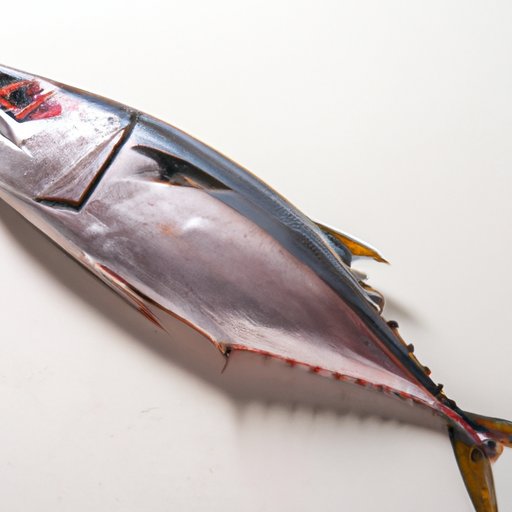
Introduction
Becoming pregnant is an exciting journey, but it comes with a lot of responsibilities, particularly around what you can and cannot eat. One food item that many expectant mothers often question is tuna. In this article, we will explore whether tuna is safe to consume during pregnancy and what the risks and benefits are.
The Benefits and Risks of Eating Tuna During Pregnancy
Tuna is a rich source of protein, omega-3 fatty acids, and other essential nutrients that support the healthy development of a growing fetus. These nutrients help to build your baby’s nervous system, eyes, and brain, which are crucial during the first trimester of pregnancy.
Despite the benefits, it’s important to note that tuna also contains mercury, which could be harmful to both the baby and the mother. Mercury is a metallic element that exists naturally in the environment and can be found in various seafood, including tuna. Consuming high levels of mercury can impair brain development, leading to learning difficulties and other developmental issues in children.
Tuna: Safe or Unsafe for Expectant Mothers?
Before eating tuna during pregnancy, it is essential to research the topic thoroughly and weigh the pros and cons carefully. While some advocate for including tuna in their diet, others warn against it.
According to the US Food and Drug Administration (FDA), expectant mothers can still consume tuna, but there are recommended guidelines on how much and what type they can eat.
Research studies examining the effects of consuming tuna during pregnancy are mixed. Some suggest it is perfectly safe, while others indicate potential harm to both the mother and the unborn child.
Pregnancy Nutrition: Can You Safely Consume Tuna?
If you want to eat tuna during pregnancy, it is important to know how much you can eat without endangering your health or your baby’s. The FDA recommends limiting the intake of canned light tuna, fresh tuna, and other fish with low mercury levels to 2-3 servings (8-12 ounces) per week.
It’s also essential to consider the type of tuna you are consuming. Albacore (white) tuna contains a higher amount of mercury compared to canned light tuna, making it less safe for pregnant women.
If you are unsure about consuming tuna, there are other protein alternatives that provide similar nutrients, such as lean meat, poultry, and beans.
Everything You Need to Know About Eating Tuna While Pregnant
If you have decided to consume tuna during pregnancy, it is important to take precautions to ensure your and your baby’s safety. When purchasing tuna, ensure it is sourced from a reputable supplier and is within the recommended guideline of 2-3 servings per week.
To minimize mercury exposure, it is advisable to avoid high-mercury tuna and opt for canned light tuna instead. Tuna steaks and fresh tunas have higher levels of mercury and must not be consumed in large amounts by pregnant women.
To Eat or Not to Eat Tuna During Pregnancy? That Is the Question
Deciding whether to eat tuna during pregnancy is a personal decision based on individual factors such as dietary restrictions, allergies, and medical conditions. However, hearing from other expectant mothers who have consumed tuna during pregnancy may help you make an informed decision.
Some women have consumed tuna throughout their pregnancy and have had healthy babies, while others have had adverse reactions. It is essential to consult your doctor and discuss the benefits and risks of consuming tuna before making a decision.
Expert Advice: Tuna Consumption During Pregnancy
To ensure your safety and the safety of your baby, it is important to seek expert advice. Medical professionals suggest that pregnant women consume a variety of low-mercury fish and seafood that provide essential nutrients while minimizing the risk of exposure to mercury.
Avoiding high-mercury seafood and being mindful of fish intake can help ensure a healthy pregnancy. Discuss your dietary needs with your healthcare provider to develop safe and healthy eating habits during pregnancy.
The Truth About Tuna and Pregnancy: Separating Fact from Fiction
There are numerous misconceptions about eating tuna during pregnancy. For example, some believe that all types of tuna should be avoided during pregnancy, while others claim that eating tuna helps boost fetal development.
It is advisable to get your information from reputable sources. Reliable sources include your healthcare provider, FDA, and Environmental Protection Agency (EPA), which offer numerals resources on safe seafood consumption.
Conclusion
Tuna can provide essential nutrients for expectant mothers. However, it is essential to balance the risks and benefits when consuming tuna during pregnancy. By following the recommended guidelines and discussing your dietary needs with your healthcare provider, you can enjoy a safe and healthy pregnancy.
Remember that everyone’s pregnancy journey is different. Consult with your healthcare provider before making any significant dietary changes and ensure all your meals, including tuna, are safe for you and your baby.




